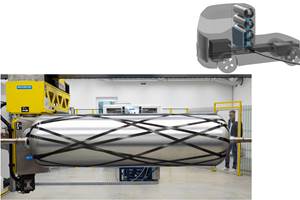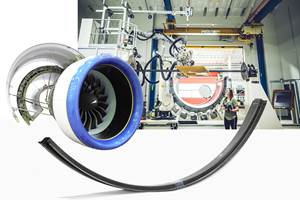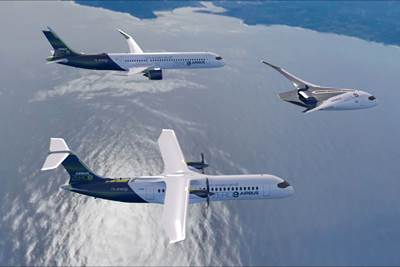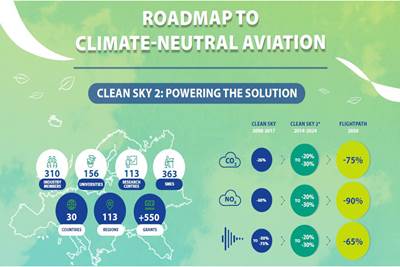Universal Hydrogen Series A funding to build and test full-scale hardware for hydrogen commercial aircraft
$23.5 million in funding to set Universal Hydrogen on a path to have carbon-free airplanes using composite tanks in commercial service by 2025.
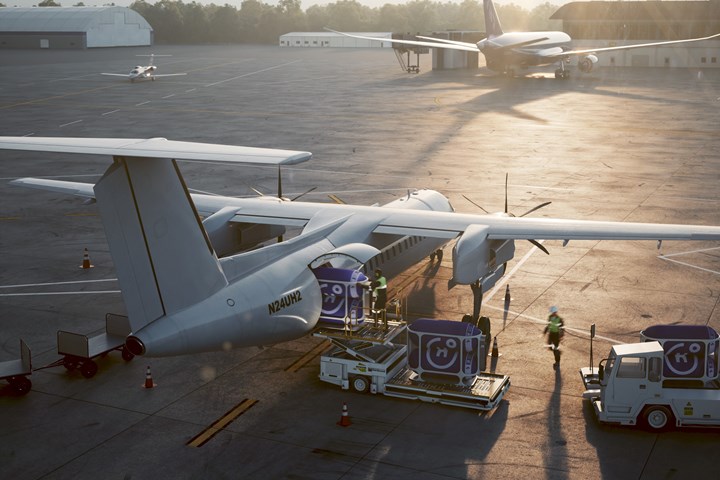
The company plans to convert the Dash 8 twin-turboprop regional aircraft (above) to hydrogen fuel-cell propulsion, which incorporates a twin-capsule module made with continuous carbon braided preform over a low permeability membrane. Photo Credit: Universal Hydrogen
On April 22 Universal Hydrogen ((Los Angeles, Calif., U.S.) announced its $20.5 million Series A financing round led by Silicon Valley venture fund, Playground Global, with the investor syndicate comprising Fortescue Future Industries, Coatue, Global Founders Capital, Plug Power, Airbus Ventures, JetBlue Technology Ventures, Toyota AI Ventures, Sojitz Corp. and Future Shape. Founded in 2020 by aviation industry veterans Paul Eremenko, John-Paul Clarke, Jason Chua and Jon Gordon, Universal Hydrogen stitches together the end-to-end hydrogen value chain for aviation, both for hydrogen fuel and hydrogen-powered airplanes.
This recent financing — which brings Universal’s total funding to $23.5 million — reportedly enables Universal Hydrogen to accelerate the development of its hydrogen logistics network and regional aircraft conversion kits, and bolsters the company’s burgeoning commercial activities (see “Universal Hydrogen uses dry braided carbon preform tanks as part of plan to decarbonize aviation”). Universal Hydrogen is building a fuel distribution network that connects hydrogen production directly to the airplane using modular capsules that are transported using the existing freight network, avoiding the need for costly new pipelines, storage facilities and fuel trucks. The company is also developing conversion kits to retrofit existing 40-60 passenger regional airplanes with a hydrogen fuel cell powertrain. First commercial flights are planned no later than 2025, with operating costs equivalent to those of conventional hydrocarbon-burning airplanes and decreasing rapidly thereafter.
“We see the near-term decarbonization of regional aviation as a first step and catalyst, setting the whole industry on a path to meeting Paris Agreement emissions targets,” says Paul Eremenko, Universal Hydrogen co-founder and CEO. “Hydrogen today is the only viable fuel for getting to true zero emissions in commercial aviation, and our goal is to de-risk the decision for Airbus, Boeing and COMAC to make their next new airplane in the 2030s a hydrogen-powered one.” To that end, Universal Hydrogen says it will make hydrogen economically and universally available at airports worldwide, work with regulators to develop appropriate certification and safety standards and demonstrate passenger enthusiasm for carbon-free, hydrogen-powered flight.
Since Universal Hydrogen’s initial fundraise and partnering with Plug Power (Latham, N.Y., U.S.) and magniX (Redmond, Wash., U.S.), the team successfully demonstrated a subscale fuel cell powertrain and hydrogen capsules. The company also secured interest from multiple airlines to serve as early customers. The current financing round will enable Universal Hydrogen to significantly grow its engineering team, complete a 2-megawatt (MW) fuel cell powertrain and fully test both liquid and gaseous hydrogen capsules. The company is taking additional airline orders for its first several years of commercial deliveries, and is also consolidating its operating footprint at Jack Northrop Field in Hawthorne, Calif.
“What attracted us to Universal Hydrogen was the team’s bold vision, depth of experience and scalable ecosystem approach,” says Peter Barrett, founder and general partner at Playground Global. “Rather than building a point solution for just one corner of the market, the team looked at the whole hydrogen value chain, identified the key gaps and developed pragmatic solutions to close them.”
Fortescue Metals Group (Fortescue) Founder and Chairman Dr. Andrew Forrest AO says Fortescue is committed to leading the global transition to a zero-carbon future by establishing global demand and supply of bulk green hydrogen. “At Fortescue Future Industries we are delighted to make this investment and support Universal Hydrogen in setting aviation on the path toward zero emissions,” says Dr. Forrest. “Aviation is an essential part of this transformation and Universal Hydrogen has emerged as the clear leader in this space. We look forward to continuing to develop our relationship as we move toward a green energy future.”
Related Content
Cryo-compressed hydrogen, the best solution for storage and refueling stations?
Cryomotive’s CRYOGAS solution claims the highest storage density, lowest refueling cost and widest operating range without H2 losses while using one-fifth the carbon fiber required in compressed gas tanks.
Read MorePlant tour: Joby Aviation, Marina, Calif., U.S.
As the advanced air mobility market begins to take shape, market leader Joby Aviation works to industrialize composites manufacturing for its first-generation, composites-intensive, all-electric air taxi.
Read MoreSulapac introduces Sulapac Flow 1.7 to replace PLA, ABS and PP in FDM, FGF
Available as filament and granules for extrusion, new wood composite matches properties yet is compostable, eliminates microplastics and reduces carbon footprint.
Read MoreThe potential for thermoplastic composite nacelles
Collins Aerospace draws on global team, decades of experience to demonstrate large, curved AFP and welded structures for the next generation of aircraft.
Read MoreRead Next
Airbus reveals new zero-emission concept aircraft
The three concepts — all codenamed ZEROe — each represent a different approach to achieving zero-emission flight. The aircraft could enter service by 2035.
Read MoreClean Sky 2 study emphasizes need for hydrogen-powered aviation development
Independent study found hydrogen as primary energy source for aircraft propulsion, outlines roadmap and required policy actions for hydrogen aviation, fuel cell technology development.
Read MoreDeveloping bonded composite repair for ships, offshore units
Bureau Veritas and industry partners issue guidelines and pave the way for certification via StrengthBond Offshore project.
Read More


















